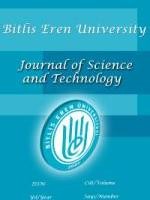Introduction to Wavelets and their applications in signal denoising
Introduction to Wavelets and their applications in signal denoising
___
- Aggarwal, R., Rathore, S., Singh, J. K., Tiwari, M., India, M. P., Gupta, V. K., & Khare, A. (2011). Noise Reduction of Speech Signal using Wavelet Transform with Modified Universal Threshold. International Journal of Computer Applications, 20(5), 975–8887.
- Bouman, C. A. (2013). Continuous Time Fourier Transform ( CTFT ). Digital Image Processing, 1–5. Cengiz, Y., Doç, Y., & Arıöz, U. (2016). Ayrık Dalgacık Dönü ¸ sümü Kullanarak Konu ¸ sma Sinyallerinin Gürültüden Arındırılması için Uygulama An Application for Speech Denoising Using Discrete Wavelet Transform, 1–4.
- Federico, A., & Kaufmann, G. H. (2009). Wavelet Transform, 34(15), 2336–2338. Guo, X., Li, Y., Suo, T., & Liang, J. (2017). De-noising of digital image correlation based on stationary wavelet transform. Optics and Lasers in Engineering, 90(July 2016), 161–172. https://doi.org/10.1016/j.optlaseng.2016.10.015
- Hazas, M., & Hall, H. (1999). Processing of Non-Stationary Audio Signals. Science, (August). Huang, W., & Macfarlane, D. L. (2012). Fast Fourier Transform and MATLAB Implementation, 1–26.
- Liu, C.-L. (2010). A Tutorial of the Wavelet Transform. National Taiwan University, Department of Electrical Engineering (NTUEE), Taiwan, 1–72. https://doi.org/10.1111/j.1600-0404.1995.tb01711.x
- Misiti, M., Misiti, Y., Oppenheim, G., & Poggi, J.-M. (2009). Wavelet Toolbox TM 4 User ’ s Guide. The MathWorks Inc., …, 11–47. Retrieved from http://feihu.eng.ua.edu/NSF_TUES/w7_1a.pdf
- Osgood, B. (2007). Lecture Notes for EE 261 The Fourier Transform and its Applications. Stanford University, 428.
- Patil, R. (2015). Noise Reduction using Wavelet Transform and Singular Vector Decomposition. Procedia Computer Science, 54, 849–853. https://doi.org/10.1016/j.procs.2015.06.099
- Patil, S. S., & Pawar, M. K. (2012). Quality advancement of EEG by wavelet denoising for biomedical analysis. Proceedings - 2012 International Conference on Communication, Information and Computing Technology, ICCICT 2012, 1–6. https://doi.org/10.1109/ICCICT.2012.6398151
- Polikar, R. (1994). The Wavelet Tutorial. Internet Resources, 1–67. https://doi.org/10.1088/1751-8113/44/8/085201 Yadav, T. (2016). Denoising and SNR Improvement of ECG Signals Using Wavelet Based Techniques, (October), 678–682.
- Yayın Aralığı: Yılda 2 Sayı
- Başlangıç: 2011
- Yayıncı: Bitlis Eren Üniversitesi
Introduction to Wavelets and their applications in signal denoising
Cigdem POLAT, Mehmet Siraç ÖZERDEM
Little Knowledgeable Mothers of Modern World: Diarrhea is an Important Public Health Problem
Eylem KUDAY KAYKISIZ, Ramazan GÜVEN, Mihriban SÖNMEZSOY, Ali TONGUN
Elastic scattering of 17F nuclei from 58Ni target: Comparison with three different models
Can Patients with Appendicitis in Pregnancy be Operated in Secondary Hospital: A retrospective Study
Adnan BUDAK, Abdullah ŞENLİKÇİ, Ramazan GÜVEN
Structural Analysis of Ahlat Emir Bayındır Bridge
Ercan IŞIK, Barış ANTEP, İbrahim Baran KARAŞİN
Measurement of anxiety and depression level for nurses
Ayşegül ALKAN EZİN, Zeynep Şefika EKŞİOĞLU, Ramazan GÜVEN
Sepsis and Nursing Care in Pediatric Patients
The Annual Change of Environmental Gamma Radiation in Bitlis
Sultan ŞAHİN BAL, Şule KARATEPE, Muhammed Fatih KULUÖZTÜRK, Engin YILMAZ, Murat KURŞAT
